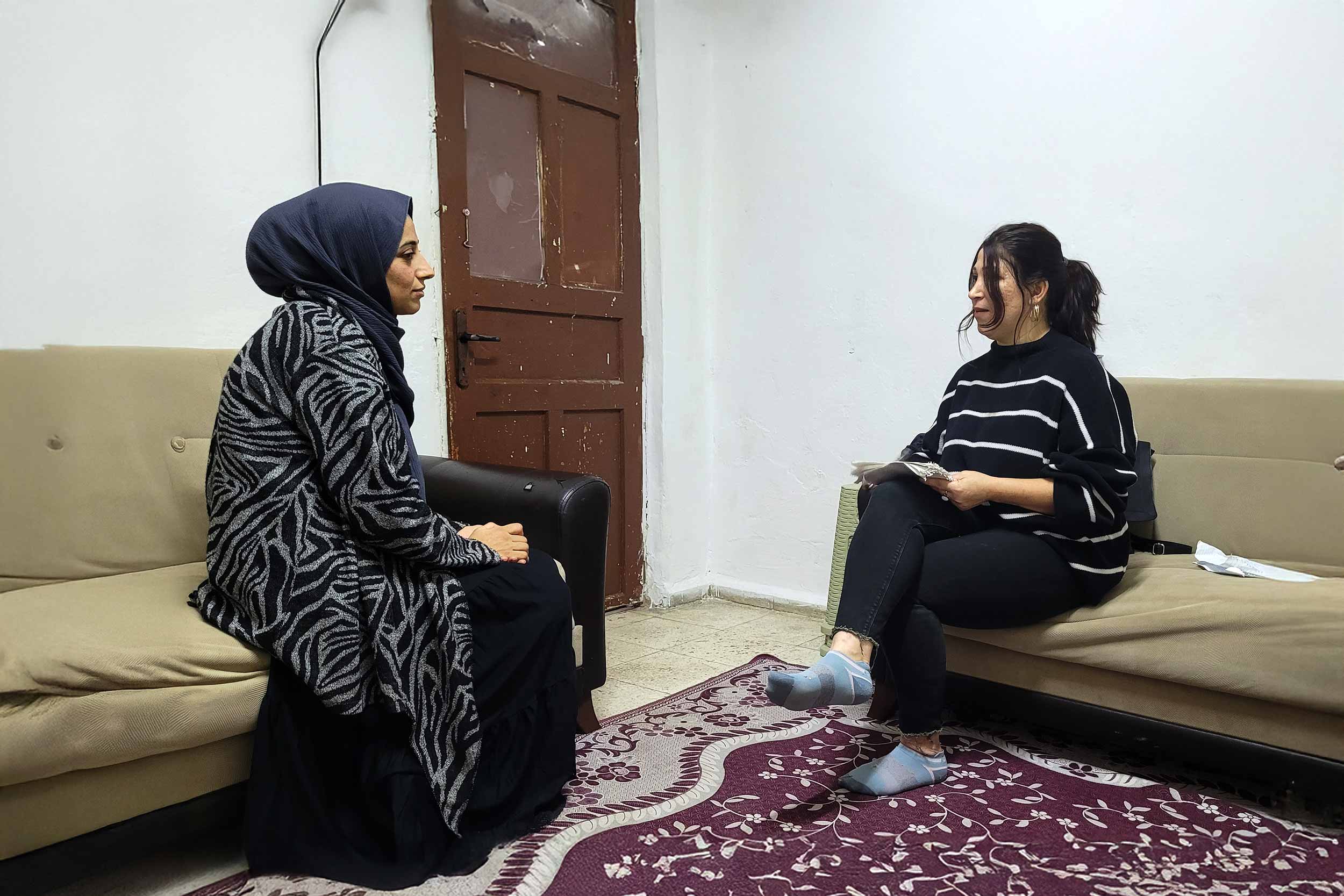Syrians in Turkey Want to Go Home – But How?
Despite jubilation over the fall of the Assad regime, many refugees fear the uncertainty of return to a war-ravaged country.
On the first day of Eid last year – when it is traditional to visit the graves of loved ones - relatives were searching for their loved ones’ resting places at a cemetery for victims of the 2023 earthquake in Hatay, southern Turkey. Rainfall had caused some of the graves to move, and the visitors were wading through puddles of mud.
The graveyard was divided in two; one side for Turkish citizens and the other for Syrians. Halime El Hammadi was standing in the latter, where all the gravestones are inscribed in Arabic. She lost two husbands in recent years: the first in Syria, during the devastating civil war that caused her to flee; the second, who she met in Turkey, to the earthquake.
“I lost half of my family in the war. I came here and I lost the other half,” she said.
Now, almost a year later, 25-year-old Hammadi finally has the chance to return to Syria following the collapse of the Assad regime in December 2024.

Despite having dreamed of this chance for years, she is hesitant to go back to her home province of Idlib.
“We don’t have anything left in Idlib,” she explained. “We lost our house in the bombing. There’s nothing to connect with there if we return. We don’t have land. Idlib suffered the largest devastation. We will wait a while longer.”
Over more than a decade of war, Turkey has played host to millions of Syrian refugees; more than any other country. The crisis has shaken Turkish politics, with anti-refugee sentiment becoming more prominent in recent years. Polls show that most Turkish citizens want Syrian refugees to return to their country.
In December 2024, data from the interior ministry showed that only around 25,000 Syrians returned in the first two weeks following the regime change.
For the moment, said Hammadi, many Syrian refugees she knows were waiting to see what happens in their home country before deciding whether to return. She added that the provision of basic needs like “electricity, water, a place to stay” would have an impact on her decision.
“None of us have houses there, we don’t have money to build houses either,” she continued. “We have been through so much that I don’t have faith in anything anymore. We will wait to see what kind of improvement could be provided to us. Sure, we would go if [support] is provided. All of the Syrians in our circle are favouring waiting a while to see what happens. That will determine whether we go back or stay.”
Hammadi’s current house is located in a slum neighborhood with one of the most beautiful views of Hatay. It’s called Bağrıyanık, “sorrow hearts” in Turkish. Looking at the neighbourhood from afar, the slums on the hill slopes are reminiscent of Brazilian favelas. Built on solid ground, the neighborhood suffered little damage in the quakes and mostly houses Syrian families.
After losing her husband, Hammadi and her child were forced to move in with her relatives here. Hammadi’s father works in public housing construction and gets paid 900 liras (25 US dollars) per day. His actual wage is 1,000 liras but 100 is cut off for his workday meal. He’s the only wage earner in the six-person family and they pay 6,000 liras (167 dollars) in rent for a dilapidated house.
Hammadi hasn’t entirely embraced the idea of her country being led by its new interim president Ahmed al-Sharaa, the former leader of the Islamist militant group Hay’at Tahrir al-Sham. She would prefer someone else.
“It should be a leader who looks out for rights and justice, who isn’t discriminatory. The new leader should be someone who would sit at my table, who is my equal. We have fought for years for the democratisation of Syria,” she said.
Clashes are ongoing in some parts of Syria, and some areas are completely devoid of essential infrastructure such as hospitals. Power and water outages can last days.
Determined to Return
According to Turkish interior ministry data, 2,920,119 Syrians live in Turkey under temporary protection. Almost half of them receive the monthly 500 lira (14 dollars) aid funded by the EU, while labour ministry data shows that only 108,250 have obtained work permits.
In reality, a much larger number of Syrians have become part of the Turkish economy in one way or another. Often employed without benefits, Syrians find work in the textile, construction and service industries. Their monthly income is often below minimum wage. Employers reap the benefits of their cheap labour, but as Turkey’s economic crisis has deepened, resentment of the refugees has risen.
Other Syrian refugees are determined to return at all costs. Hama native, 32-year-old Abdulaziz Atiya celebrated with friends and family when he heard about the fall of the Assad regime.

Atiya studied Arabic language and literature at Hama University. He quit school and migrated to Turkey 13 years ago; his brother was imprisoned in Syria’s notorious Sednaya prison and was never heard from again.
Atiya worked in construction upon his arrival in Turkey, but later found work as a middleman through connections he made, living in Antakya’s majority-Syrian Narlıca neighborhood. His two-year-old daughter died in a hospital that collapsed in the February 2023 earthquake. He is grateful to Turkey for welcoming his family, but he wants to return to his Syria. He is hopeful for his country and wants the new administration to be inclusive.
“This is not my homeland. The conditions here were not dire, the people here didn’t put us through the wringer, but it’s not my land, it’s not my country. I miss Hama a lot,” he said.
His relatives in Hama sent photos of his house to give him a sense of the situation there. He admits that it will require some work.
“When the construction is done, we’ll go as a whole family and we’ll continue to live there,” he said. “I plan on getting to Hama by February or March. I’m going to open up a driving school when I get back. I know that Syria is not habitable at the moment but it will never get back on its feet if I don’t return.”
Another resident of Hammadi’s neighborhood, 55-year-old İsmail Eş Şerif, hasn’t yet made up his mind about returning. Şerif, who came in 2018 from Aleppo, used to be a dealer in car parts but now sells phone accessories. His sons, 17 and 19, attend a vocational high school in Antakya.
“This is my homeland,” he said of Antakya, where he feels he has been welcomed. Şerif is delighted about regime change in Syria but does not think that life there would be secure.
“Our contacts there said that the power is on for only two hours, they haven’t had running water in 15 days. Some say it’s good, some say it’s bad,” he said.
Şerif, like Hammadi, says that he would consider returning if there is aid.
Cavidan Soykan, an academic focusing on refugee rights and migration, agreed that the fall of the Assad regime offers the “possibility of a new start” for Syrians, but strikes a note of caution.
“It is possible only if their country, which has become a global geopolitical playground, is returned to their will,” Soykan said.
“The complete end to the multi-actor war and the country’s democratic transition can only be provided with the rebuilding of security and infrastructure like the health system, which has been completely wiped out in some areas.”
Soykan notes that there is no legal basis for the “repatriation of refugees” after the fall of Assad. Forced removal of Syrian refugees against their will, while the country is still not secure, would constitute a violation of their rights.
